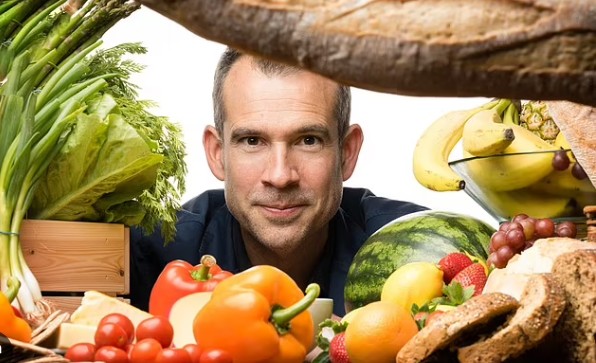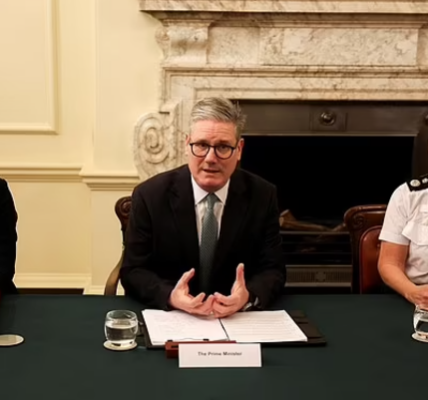Unhealthiest UPFs should come with tobacco-style warning labels and have a marketing ban for young children, says Dr Chris van Tulleken_Nhy
Britain’s most unhealthy processed foods should come with tobacco-style warning labels and have a marketing ban for young children, according to an expert.
Chris van Tulleken, infectious diseases doctor and author of ‘Ultra-Processed People’, said current food label systems are ‘ineffective’ and ‘misleading’ for consumers.
Instead, he recommends putting specific warning labels on foods that are high in salt, fat, sugar or calories.
This would include soft drinks, sweets, all salty and sugary snacks and many breakfast cereals.
And he argues that manufacturers should not be allowed to market these products at children, use cartoon characters in advertising or make a health claim about them.
The current food labelling system includes the traffic light scheme which uses green, amber and red colours to indicate how a food scores against certain dietary guidelines.
However critics argue there are no strict regulations regarding their use, they may not accurately reflect the overall nutrient content of a product, and there may be a general lack of understanding from the public about what it means.
There are also some advertising restrictions aimed at food that is ‘high fat, salt and sugar’ (HFSS), but these can be circumvented if a product boasts other qualities such as containing vegetables or protein.

Chris van Tulleken (pictured), infectious diseases doctor and author of ‘Ultra-Processed People’, said current food label systems are ‘ineffective’ and ‘misleading’ for consumers

A collection of ultra processed food. Britain’s most unhealthy foods should come with tobacco-style warning labels and have a marketing ban for young children, according to an expert
‘Traffic lights are misleading,’ Dr van Tulleken said. ‘They are voluntary, they are unhinged from any national dietary guidance, and they are not effective.
‘Manufacturers can stick three green traffic lights on the side of your sugar-sweetened Cola, so it looks like it’s 75 per cent healthy.
‘These traffic lights and HFSS advertising regulations have been in use for more than a decade and during that time we have seen a steady increase in rates of diet-related disease in kids and grown-ups.
‘So they don’t work.’
While he isn’t calling for pictures of cancer patients on packaging – like cigarette boxes sometimes feature – he argues for a system similar to that used in South America, specifically in Chile and Mexico, where black octagon symbols can be seen adorning the front of certain food packages.
These warning symbols signify that the product contains ‘excess’ sugar, calories, salt or saturated fat.
‘Once a product has a black octagon it cannot have a cartoon character, it cannot have a health claim, it can’t be marketed to a child,’ Dr van Tulleken said.
‘It can’t be sold in a school or hospital. It can’t be served in a prison.

Dr van Tulleken (pictured) has also argued that a sugar tax – which has already been implemented for sugar-sweetened drinks – should also be applied to sweets.
‘Octagons are probably where we’re heading. Unless we start with an approach that takes this view, we aren’t going to get anywhere.
‘The approach should be to say, ‘We have a terrible crisis, an emergency that needs solving, and we need to think about radical solutions.’
‘Until we think about regulating the industry, we’re not going to see a massive change.
‘These regulations should be brought in carefully in a way that allows industry to reformulate products and bring them into line with dietary guidance.’
He also argued that a sugar tax – which has already been implemented for sugar-sweetened drinks – should also be applied to sweets.
A junk food advertising ban, recently announced by Labour, means that from October next year it will be illegal to advertise ‘less healthy’ food and drink on TV before the 9pm watershed and online at any time.
However, the government’s own impact assessment found it is likely to cut just two calories a day from children’s diets – equal to less than a tenth of a Jelly Baby, and critics have pointed out the ban covers porridge oats and crumpets but not greasy sausage rolls and pies.
A recent study revealed that toddlers in the UK get nearly half their daily calories from ultra-processed foods (UPFs), rising to 59 per cent by the age of seven.

Dr van Tulleken’s comments come ahead of the Royal Institution’s Christmas lectures, which he will be presenting this year. During the lectures, aimed at young people aged 11 to 17, he will be exploring the importance of our gut microbiome
Researchers from University College London warned that highly-processed foods, which often contain excessive amounts of salt and sugar, are often cheaper than fruit and vegetables.
Analysis revealed the most common UPFs eaten by toddlers aged 21 months were flavoured yoghurts and wholegrain breakfast cereals.
Meanwhile among seven-year-olds the most common were sweet cereals, white bread and puddings.
Dr van Tulleken’s comments come ahead of the Royal Institution’s Christmas lectures, which he will be presenting this year.
During the lectures, aimed at young people aged 11 to 17, he will be exploring the importance of our gut microbiome – the ‘good’ and ‘bad’ bacteria that are present in our gut – and how what we eat has shaped our evolution.
The lectures will be broadcast on BBC4 and iPlayer at 9pm on 29, 30 and 31 December.
A Department of Health and Social Care spokeswoman said: ‘Every child deserves a healthy, happy start to life.
‘This government is taking action now to end the targeting of junk food ads at kids, across both TV and online. This is the first step to deliver a major shift in the focus of healthcare from sickness to prevention through our 10 Year Health Plan.

A fast food worker in a chicken shop (stock image). Researchers from University College London warned that highly-processed foods, which often contain excessive amounts of salt and sugar, are often cheaper than fruit and vegetables
‘We’re also limiting children’s access to fast food, giving local authorities the powers to block applications for unhealthy takeaways near schools and reviewing the Soft Drinks Industry Levy to ensure it remains effective in tackling obesity and other harms caused by a high sugar intake.’
A spokeswoman from the Food and Drink Federation said: ‘Food and drink manufacturers have a legal obligation to provide accurate nutrition information on their packaging.
‘The UK’s traffic light system is the government’s recommended approach to help people understand what’s in their food and is based on criteria set by government.
‘The traffic light system provides clear information on what’s a ‘high’ level for certain nutrients, such as fat, salt and sugar, as well as what’s ‘low’.
‘Research shows that colour-coded systems are the most effective design for nutrition labels. However, given the current traffic light system was introduced 20 years ago, we would support a government review of the latest evidence into how nutrition labelling can best help shoppers make healthier choices.’



